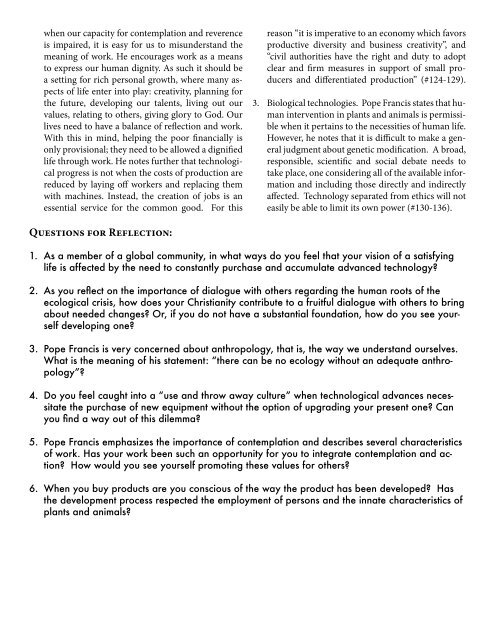Study Guide for Laudato Si’
Laudato%20Si%20Study%20Guide.EN
Laudato%20Si%20Study%20Guide.EN
Create successful ePaper yourself
Turn your PDF publications into a flip-book with our unique Google optimized e-Paper software.
when our capacity <strong>for</strong> contemplation and reverence<br />
is impaired, it is easy <strong>for</strong> us to misunderstand the<br />
meaning of work. He encourages work as a means<br />
to express our human dignity. As such it should be<br />
a setting <strong>for</strong> rich personal growth, where many aspects<br />
of life enter into play: creativity, planning <strong>for</strong><br />
the future, developing our talents, living out our<br />
values, relating to others, giving glory to God. Our<br />
lives need to have a balance of reflection and work.<br />
With this in mind, helping the poor financially is<br />
only provisional; they need to be allowed a dignified<br />
life through work. He notes further that technological<br />
progress is not when the costs of production are<br />
reduced by laying off workers and replacing them<br />
with machines. Instead, the creation of jobs is an<br />
essential service <strong>for</strong> the common good. For this<br />
reason “it is imperative to an economy which favors<br />
productive diversity and business creativity”, and<br />
“civil authorities have the right and duty to adopt<br />
clear and firm measures in support of small producers<br />
and differentiated production” (#124-129).<br />
3. Biological technologies. Pope Francis states that human<br />
intervention in plants and animals is permissible<br />
when it pertains to the necessities of human life.<br />
However, he notes that it is difficult to make a general<br />
judgment about genetic modification. A broad,<br />
responsible, scientific and social debate needs to<br />
take place, one considering all of the available in<strong>for</strong>mation<br />
and including those directly and indirectly<br />
affected. Technology separated from ethics will not<br />
easily be able to limit its own power (#130-136).<br />
Questions <strong>for</strong> Reflection:<br />
1. As a member of a global community, in what ways do you feel that your vision of a satisfying<br />
life is affected by the need to constantly purchase and accumulate advanced technology?<br />
2. As you reflect on the importance of dialogue with others regarding the human roots of the<br />
ecological crisis, how does your Christianity contribute to a fruitful dialogue with others to bring<br />
about needed changes? Or, if you do not have a substantial foundation, how do you see yourself<br />
developing one?<br />
3. Pope Francis is very concerned about anthropology, that is, the way we understand ourselves.<br />
What is the meaning of his statement: “there can be no ecology without an adequate anthropology”?<br />
4. Do you feel caught into a “use and throw away culture” when technological advances necessitate<br />
the purchase of new equipment without the option of upgrading your present one? Can<br />
you find a way out of this dilemma?<br />
5. Pope Francis emphasizes the importance of contemplation and describes several characteristics<br />
of work. Has your work been such an opportunity <strong>for</strong> you to integrate contemplation and action?<br />
How would you see yourself promoting these values <strong>for</strong> others?<br />
6. When you buy products are you conscious of the way the product has been developed? Has<br />
the development process respected the employment of persons and the innate characteristics of<br />
plants and animals?


